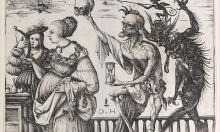Mathimatically gifted use brain to its full potential
New experiments show that the mathematically gifted are better at making the two halves of the brain work together co-operatively. This helps in understanding maths because it enhances high-level imagery and spatial skills, Michael O’Boyle, of the University of Melbourne, says.
With a colleague in the US, he tested 60 boys and young men, all aged between 13 and the the early 20s. Of the younger boys, 18 were gifted mathematicians, recruited from a programme at the University of Iowa that seeks out bright young students.
They were shown letters flashed on to a screen. The letters were made up of small letters that were grouped to form a single large letter - a lot of small Ts, for example, were assembled to form a single large T.
The patterns were flashed either to the right eye, the left eye or both eyes. The boys were asked to say as quickly as they could if the small or the big letters matched, report timesonline.co.uk
According to nytimes.com boys who are gifted in math are better at using both hemispheres of the brain to solve problems than are students of average math ability, a study published yesterday concluded. Earlier research on math whizzes found that they were usually male, left-handed and possibly better at using both hemispheres of the brain to process information, according to the report, in the journal Neuropsychology.
The subjects were asked to determine if a pair of letters flashing on a screen were the same or different. The research supports the broader notion that "the functional (though not necessarily structural) organisation of the brain may be an important contributor to individual differences in cognitive abilities, talents and, at the very least, information-processing styles," says co-author Michael O'Boyle.
"Various expressions of exceptionality, such as giftedness in math, music or art, may be the byproduct of a brain that has functionally organised itself in a qualitatively different way than the usual left/right hemispheric asymmetry."
At the same time, O'Boyle is not sure whether the findings could apply to math education in general. "Our work may perhaps have something to say about the optimal timing of when a particular brain is most 'ready to learn' or acquire a given skill, but I don't think we can 'create' a math genius without the innate talent already there," he says.
Finally, given the rising use of testosterone by adult men, O'Boyle cautions that, "Testosterone taken later in life will not help your math, as the window of influence on brain development is pretty much prenatal. It may enhance muscle mass, but it is unlikely to help you solve calculus problems," inform indiatimes.com
Subscribe to Pravda.Ru Telegram channel, Facebook, RSS!





